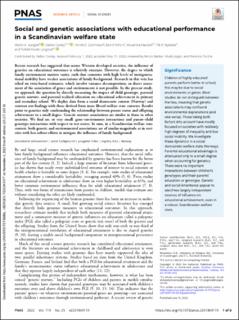| dc.contributor.author | Isungset, Martin Arstad | |
| dc.contributor.author | Conley, Dalton C | |
| dc.contributor.author | Zachrisson, Henrik Daae | |
| dc.contributor.author | Ystrøm, Eivind | |
| dc.contributor.author | Havdahl, Alexandra | |
| dc.contributor.author | Njølstad, Pål Rasmus | |
| dc.contributor.author | Lyngstad, Torkild Hovde | |
| dc.date.accessioned | 2022-11-10T12:31:58Z | |
| dc.date.available | 2022-11-10T12:31:58Z | |
| dc.date.created | 2022-08-18T11:17:01Z | |
| dc.date.issued | 2022 | |
| dc.identifier.issn | 0027-8424 | |
| dc.identifier.uri | https://hdl.handle.net/11250/3031193 | |
| dc.description.abstract | Recent research has suggested that across Western developed societies, the influence of genetics on educational outcomes is relatively constant. However, the degree to which family environment matters varies, such that countries with high levels of intergenerational mobility have weaker associations of family background. Research in this vein has relied on twin-based estimates, which involve variance decomposition, so direct assessment of the association of genes and environments is not possible. In the present study, we approach the question by directly measuring the impact of child genotype, parental genetic nurture, and parental realized education on educational achievement in primary and secondary school. We deploy data from a social democratic context (Norway) and contrast our findings with those derived from more liberal welfare state contexts. Results point to genetics only confounding the relationship between parent status and offspring achievement to a small degree. Genetic nurture associations are similar to those in other societies. We find no, or very small, gene–environment interactions and parent–child genotype interactions with respect to test scores. In sum, in a Scandinavian welfare state context, both genetic and environmental associations are of similar magnitude as in societies with less-robust efforts to mitigate the influence of family background. | en_US |
| dc.language.iso | eng | en_US |
| dc.publisher | National Academy of Sciences | en_US |
| dc.rights | Attribution-NonCommercial-NoDerivatives 4.0 Internasjonal | * |
| dc.rights.uri | http://creativecommons.org/licenses/by-nc-nd/4.0/deed.no | * |
| dc.title | Social and genetic associations with educational performance in a Scandinavian welfare state | en_US |
| dc.type | Journal article | en_US |
| dc.type | Peer reviewed | en_US |
| dc.description.version | publishedVersion | en_US |
| dc.rights.holder | Copyright 2022 The Author(s) | en_US |
| dc.source.articlenumber | e2201869119 | en_US |
| cristin.ispublished | true | |
| cristin.fulltext | original | |
| cristin.qualitycode | 2 | |
| dc.identifier.doi | 10.1073/pnas.2201869119 | |
| dc.identifier.cristin | 2044080 | |
| dc.source.journal | Proceedings of the National Academy of Sciences of the United States of America | en_US |
| dc.identifier.citation | Proceedings of the National Academy of Sciences of the United States of America. 2022, 119 (25), e2201869119. | en_US |
| dc.source.volume | 119 | en_US |
| dc.source.issue | 25 | en_US |

